Work-Based Learning: Managing Innovation Project in Hospitality
VerifiedAdded on 2023/06/15
|12
|3153
|199
Report
AI Summary
This report presents a work-based learning project focused on introducing robots into the Britannia International Hotel Canary Wharf to enhance guest experience and operational efficiency. The project encompasses planning, initiation, management, monitoring, and evaluation throughout the project lifecycle. It outlines the aims, objectives, and targets of implementing robots for various tasks such as room service, cooking, and front desk services. The report also discusses strategies for meeting project deadlines and the benefits of each stage of the project lifecycle, including improved communication and structured project delivery. Furthermore, it evaluates the experience and learning at the workplace using frameworks like SWOT and PESTLE analysis to assess the strengths, weaknesses, opportunities, and threats associated with robot implementation, providing a comprehensive overview of the project's impact and potential.
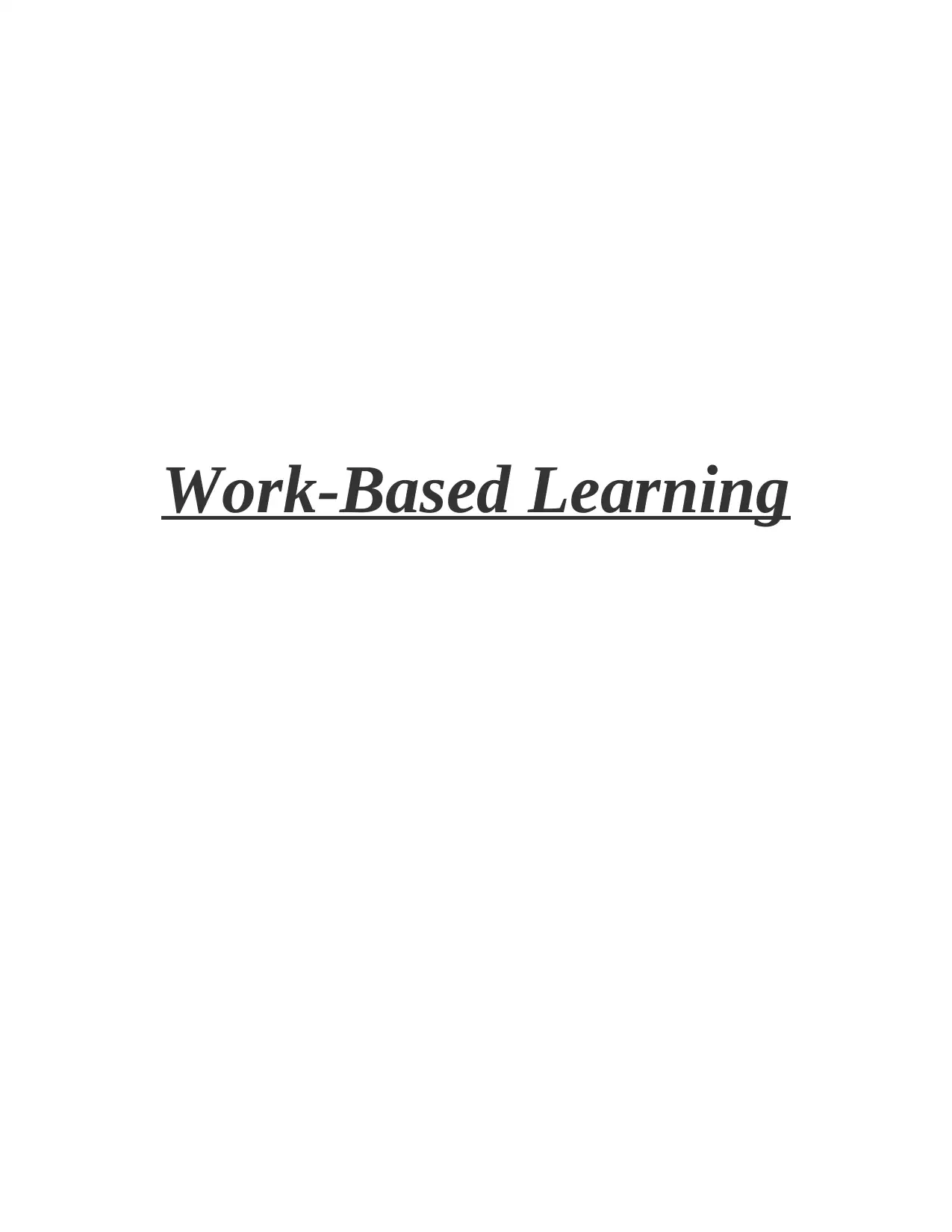
Work-Based Learning
Paraphrase This Document
Need a fresh take? Get an instant paraphrase of this document with our AI Paraphraser
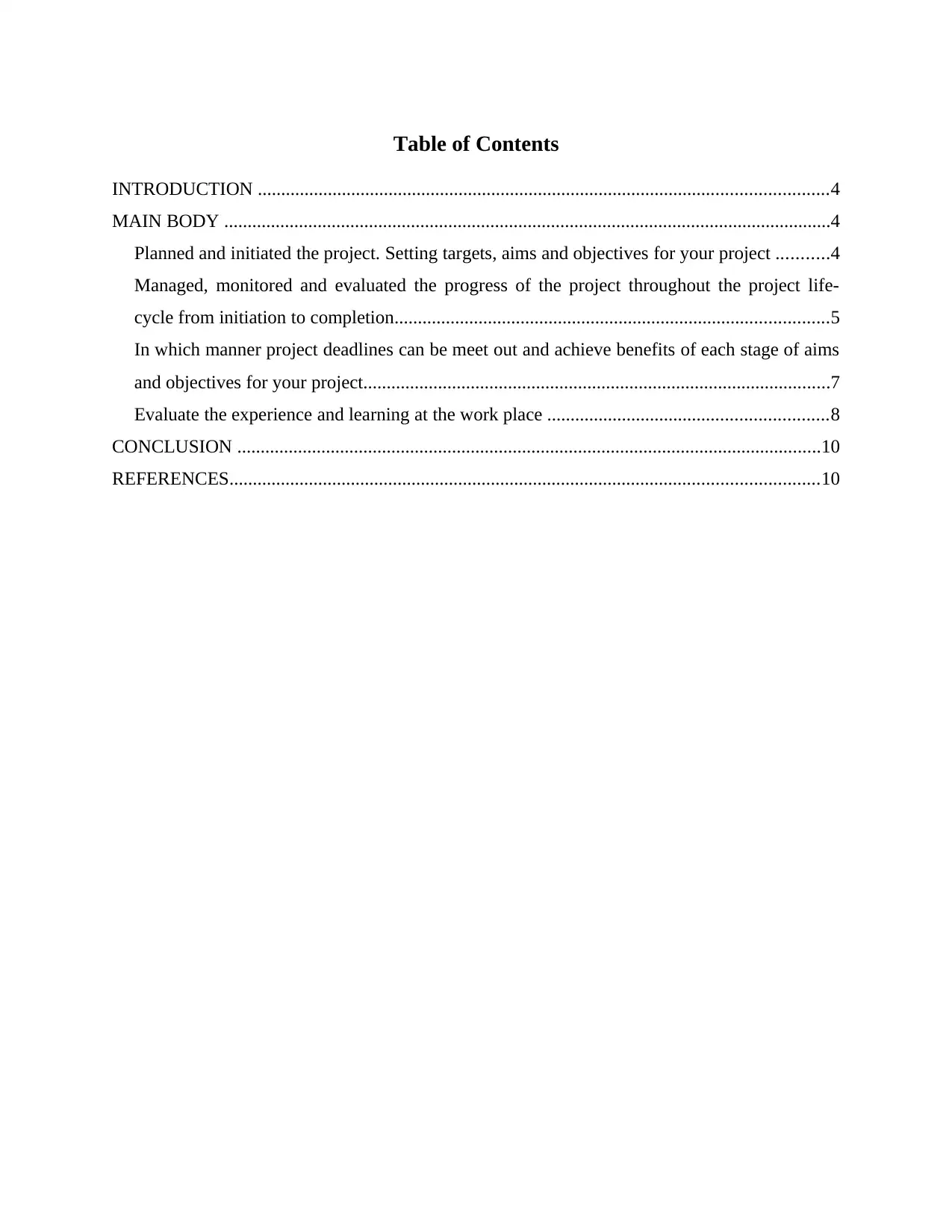
Table of Contents
INTRODUCTION ..........................................................................................................................4
MAIN BODY ..................................................................................................................................4
Planned and initiated the project. Setting targets, aims and objectives for your project ...........4
Managed, monitored and evaluated the progress of the project throughout the project life-
cycle from initiation to completion.............................................................................................5
In which manner project deadlines can be meet out and achieve benefits of each stage of aims
and objectives for your project....................................................................................................7
Evaluate the experience and learning at the work place ............................................................8
CONCLUSION .............................................................................................................................10
REFERENCES..............................................................................................................................10
INTRODUCTION ..........................................................................................................................4
MAIN BODY ..................................................................................................................................4
Planned and initiated the project. Setting targets, aims and objectives for your project ...........4
Managed, monitored and evaluated the progress of the project throughout the project life-
cycle from initiation to completion.............................................................................................5
In which manner project deadlines can be meet out and achieve benefits of each stage of aims
and objectives for your project....................................................................................................7
Evaluate the experience and learning at the work place ............................................................8
CONCLUSION .............................................................................................................................10
REFERENCES..............................................................................................................................10
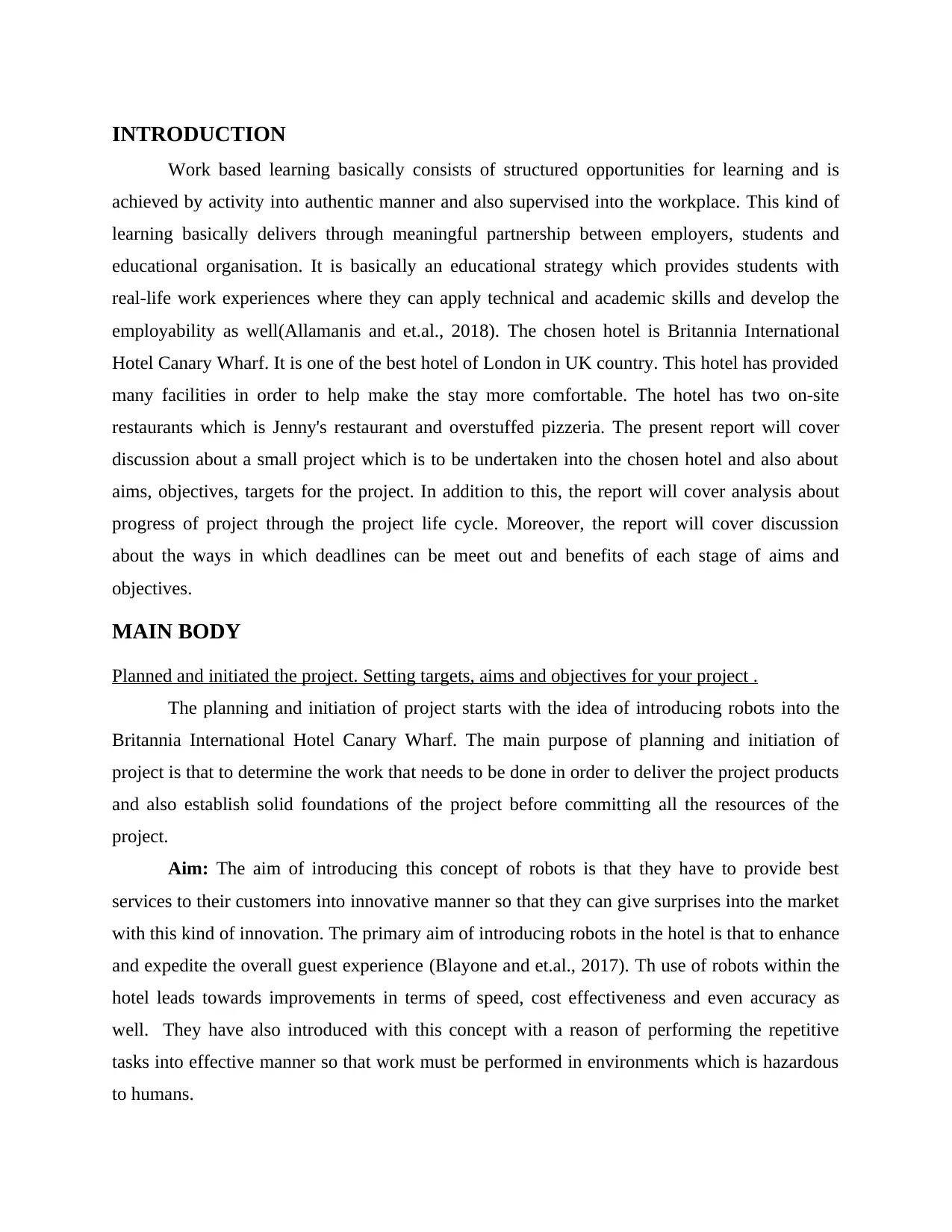
INTRODUCTION
Work based learning basically consists of structured opportunities for learning and is
achieved by activity into authentic manner and also supervised into the workplace. This kind of
learning basically delivers through meaningful partnership between employers, students and
educational organisation. It is basically an educational strategy which provides students with
real-life work experiences where they can apply technical and academic skills and develop the
employability as well(Allamanis and et.al., 2018). The chosen hotel is Britannia International
Hotel Canary Wharf. It is one of the best hotel of London in UK country. This hotel has provided
many facilities in order to help make the stay more comfortable. The hotel has two on-site
restaurants which is Jenny's restaurant and overstuffed pizzeria. The present report will cover
discussion about a small project which is to be undertaken into the chosen hotel and also about
aims, objectives, targets for the project. In addition to this, the report will cover analysis about
progress of project through the project life cycle. Moreover, the report will cover discussion
about the ways in which deadlines can be meet out and benefits of each stage of aims and
objectives.
MAIN BODY
Planned and initiated the project. Setting targets, aims and objectives for your project .
The planning and initiation of project starts with the idea of introducing robots into the
Britannia International Hotel Canary Wharf. The main purpose of planning and initiation of
project is that to determine the work that needs to be done in order to deliver the project products
and also establish solid foundations of the project before committing all the resources of the
project.
Aim: The aim of introducing this concept of robots is that they have to provide best
services to their customers into innovative manner so that they can give surprises into the market
with this kind of innovation. The primary aim of introducing robots in the hotel is that to enhance
and expedite the overall guest experience (Blayone and et.al., 2017). Th use of robots within the
hotel leads towards improvements in terms of speed, cost effectiveness and even accuracy as
well. They have also introduced with this concept with a reason of performing the repetitive
tasks into effective manner so that work must be performed in environments which is hazardous
to humans.
Work based learning basically consists of structured opportunities for learning and is
achieved by activity into authentic manner and also supervised into the workplace. This kind of
learning basically delivers through meaningful partnership between employers, students and
educational organisation. It is basically an educational strategy which provides students with
real-life work experiences where they can apply technical and academic skills and develop the
employability as well(Allamanis and et.al., 2018). The chosen hotel is Britannia International
Hotel Canary Wharf. It is one of the best hotel of London in UK country. This hotel has provided
many facilities in order to help make the stay more comfortable. The hotel has two on-site
restaurants which is Jenny's restaurant and overstuffed pizzeria. The present report will cover
discussion about a small project which is to be undertaken into the chosen hotel and also about
aims, objectives, targets for the project. In addition to this, the report will cover analysis about
progress of project through the project life cycle. Moreover, the report will cover discussion
about the ways in which deadlines can be meet out and benefits of each stage of aims and
objectives.
MAIN BODY
Planned and initiated the project. Setting targets, aims and objectives for your project .
The planning and initiation of project starts with the idea of introducing robots into the
Britannia International Hotel Canary Wharf. The main purpose of planning and initiation of
project is that to determine the work that needs to be done in order to deliver the project products
and also establish solid foundations of the project before committing all the resources of the
project.
Aim: The aim of introducing this concept of robots is that they have to provide best
services to their customers into innovative manner so that they can give surprises into the market
with this kind of innovation. The primary aim of introducing robots in the hotel is that to enhance
and expedite the overall guest experience (Blayone and et.al., 2017). Th use of robots within the
hotel leads towards improvements in terms of speed, cost effectiveness and even accuracy as
well. They have also introduced with this concept with a reason of performing the repetitive
tasks into effective manner so that work must be performed in environments which is hazardous
to humans.
⊘ This is a preview!⊘
Do you want full access?
Subscribe today to unlock all pages.

Trusted by 1+ million students worldwide
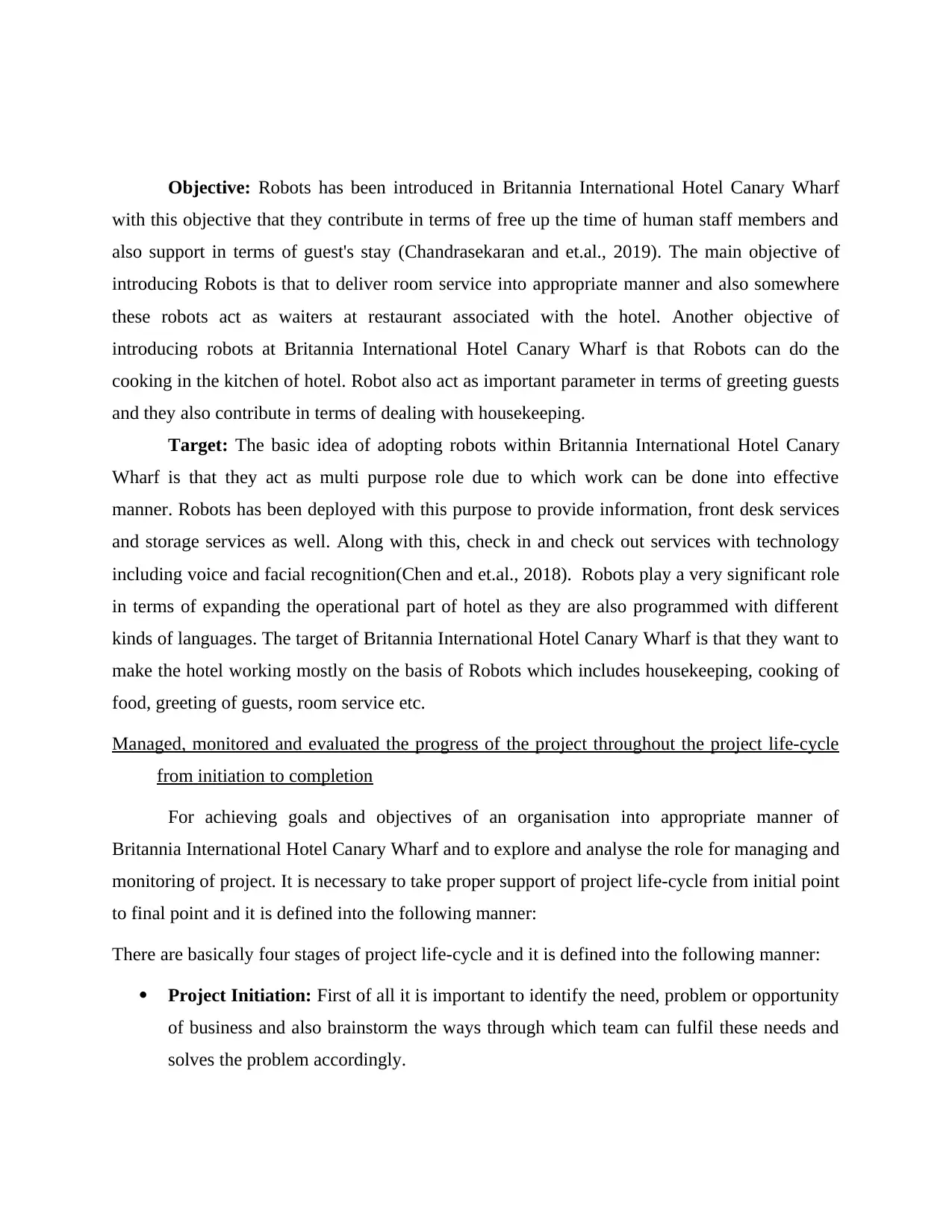
Objective: Robots has been introduced in Britannia International Hotel Canary Wharf
with this objective that they contribute in terms of free up the time of human staff members and
also support in terms of guest's stay (Chandrasekaran and et.al., 2019). The main objective of
introducing Robots is that to deliver room service into appropriate manner and also somewhere
these robots act as waiters at restaurant associated with the hotel. Another objective of
introducing robots at Britannia International Hotel Canary Wharf is that Robots can do the
cooking in the kitchen of hotel. Robot also act as important parameter in terms of greeting guests
and they also contribute in terms of dealing with housekeeping.
Target: The basic idea of adopting robots within Britannia International Hotel Canary
Wharf is that they act as multi purpose role due to which work can be done into effective
manner. Robots has been deployed with this purpose to provide information, front desk services
and storage services as well. Along with this, check in and check out services with technology
including voice and facial recognition(Chen and et.al., 2018). Robots play a very significant role
in terms of expanding the operational part of hotel as they are also programmed with different
kinds of languages. The target of Britannia International Hotel Canary Wharf is that they want to
make the hotel working mostly on the basis of Robots which includes housekeeping, cooking of
food, greeting of guests, room service etc.
Managed, monitored and evaluated the progress of the project throughout the project life-cycle
from initiation to completion
For achieving goals and objectives of an organisation into appropriate manner of
Britannia International Hotel Canary Wharf and to explore and analyse the role for managing and
monitoring of project. It is necessary to take proper support of project life-cycle from initial point
to final point and it is defined into the following manner:
There are basically four stages of project life-cycle and it is defined into the following manner:
Project Initiation: First of all it is important to identify the need, problem or opportunity
of business and also brainstorm the ways through which team can fulfil these needs and
solves the problem accordingly.
with this objective that they contribute in terms of free up the time of human staff members and
also support in terms of guest's stay (Chandrasekaran and et.al., 2019). The main objective of
introducing Robots is that to deliver room service into appropriate manner and also somewhere
these robots act as waiters at restaurant associated with the hotel. Another objective of
introducing robots at Britannia International Hotel Canary Wharf is that Robots can do the
cooking in the kitchen of hotel. Robot also act as important parameter in terms of greeting guests
and they also contribute in terms of dealing with housekeeping.
Target: The basic idea of adopting robots within Britannia International Hotel Canary
Wharf is that they act as multi purpose role due to which work can be done into effective
manner. Robots has been deployed with this purpose to provide information, front desk services
and storage services as well. Along with this, check in and check out services with technology
including voice and facial recognition(Chen and et.al., 2018). Robots play a very significant role
in terms of expanding the operational part of hotel as they are also programmed with different
kinds of languages. The target of Britannia International Hotel Canary Wharf is that they want to
make the hotel working mostly on the basis of Robots which includes housekeeping, cooking of
food, greeting of guests, room service etc.
Managed, monitored and evaluated the progress of the project throughout the project life-cycle
from initiation to completion
For achieving goals and objectives of an organisation into appropriate manner of
Britannia International Hotel Canary Wharf and to explore and analyse the role for managing and
monitoring of project. It is necessary to take proper support of project life-cycle from initial point
to final point and it is defined into the following manner:
There are basically four stages of project life-cycle and it is defined into the following manner:
Project Initiation: First of all it is important to identify the need, problem or opportunity
of business and also brainstorm the ways through which team can fulfil these needs and
solves the problem accordingly.
Paraphrase This Document
Need a fresh take? Get an instant paraphrase of this document with our AI Paraphraser
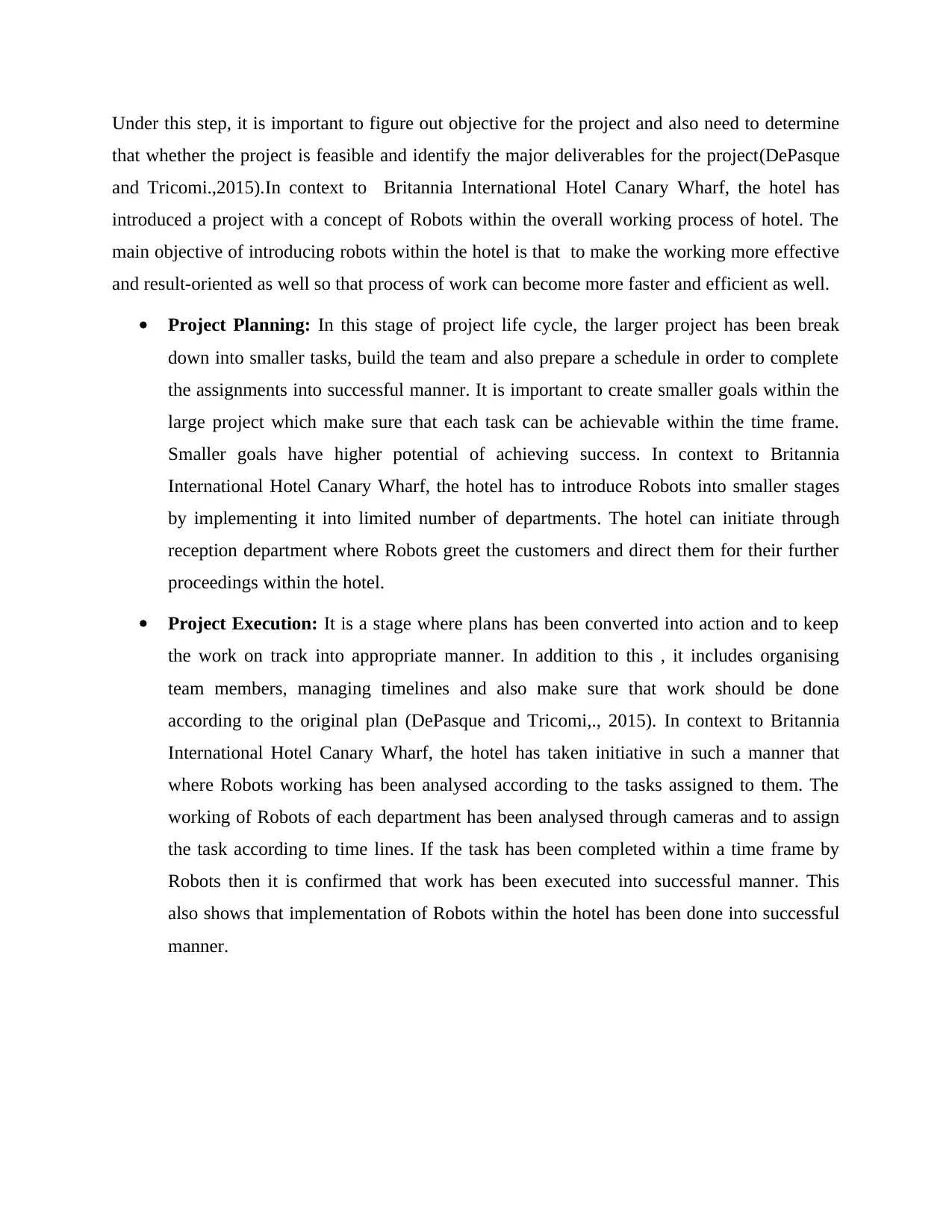
Under this step, it is important to figure out objective for the project and also need to determine
that whether the project is feasible and identify the major deliverables for the project(DePasque
and Tricomi.,2015).In context to Britannia International Hotel Canary Wharf, the hotel has
introduced a project with a concept of Robots within the overall working process of hotel. The
main objective of introducing robots within the hotel is that to make the working more effective
and result-oriented as well so that process of work can become more faster and efficient as well.
Project Planning: In this stage of project life cycle, the larger project has been break
down into smaller tasks, build the team and also prepare a schedule in order to complete
the assignments into successful manner. It is important to create smaller goals within the
large project which make sure that each task can be achievable within the time frame.
Smaller goals have higher potential of achieving success. In context to Britannia
International Hotel Canary Wharf, the hotel has to introduce Robots into smaller stages
by implementing it into limited number of departments. The hotel can initiate through
reception department where Robots greet the customers and direct them for their further
proceedings within the hotel.
Project Execution: It is a stage where plans has been converted into action and to keep
the work on track into appropriate manner. In addition to this , it includes organising
team members, managing timelines and also make sure that work should be done
according to the original plan (DePasque and Tricomi,., 2015). In context to Britannia
International Hotel Canary Wharf, the hotel has taken initiative in such a manner that
where Robots working has been analysed according to the tasks assigned to them. The
working of Robots of each department has been analysed through cameras and to assign
the task according to time lines. If the task has been completed within a time frame by
Robots then it is confirmed that work has been executed into successful manner. This
also shows that implementation of Robots within the hotel has been done into successful
manner.
that whether the project is feasible and identify the major deliverables for the project(DePasque
and Tricomi.,2015).In context to Britannia International Hotel Canary Wharf, the hotel has
introduced a project with a concept of Robots within the overall working process of hotel. The
main objective of introducing robots within the hotel is that to make the working more effective
and result-oriented as well so that process of work can become more faster and efficient as well.
Project Planning: In this stage of project life cycle, the larger project has been break
down into smaller tasks, build the team and also prepare a schedule in order to complete
the assignments into successful manner. It is important to create smaller goals within the
large project which make sure that each task can be achievable within the time frame.
Smaller goals have higher potential of achieving success. In context to Britannia
International Hotel Canary Wharf, the hotel has to introduce Robots into smaller stages
by implementing it into limited number of departments. The hotel can initiate through
reception department where Robots greet the customers and direct them for their further
proceedings within the hotel.
Project Execution: It is a stage where plans has been converted into action and to keep
the work on track into appropriate manner. In addition to this , it includes organising
team members, managing timelines and also make sure that work should be done
according to the original plan (DePasque and Tricomi,., 2015). In context to Britannia
International Hotel Canary Wharf, the hotel has taken initiative in such a manner that
where Robots working has been analysed according to the tasks assigned to them. The
working of Robots of each department has been analysed through cameras and to assign
the task according to time lines. If the task has been completed within a time frame by
Robots then it is confirmed that work has been executed into successful manner. This
also shows that implementation of Robots within the hotel has been done into successful
manner.
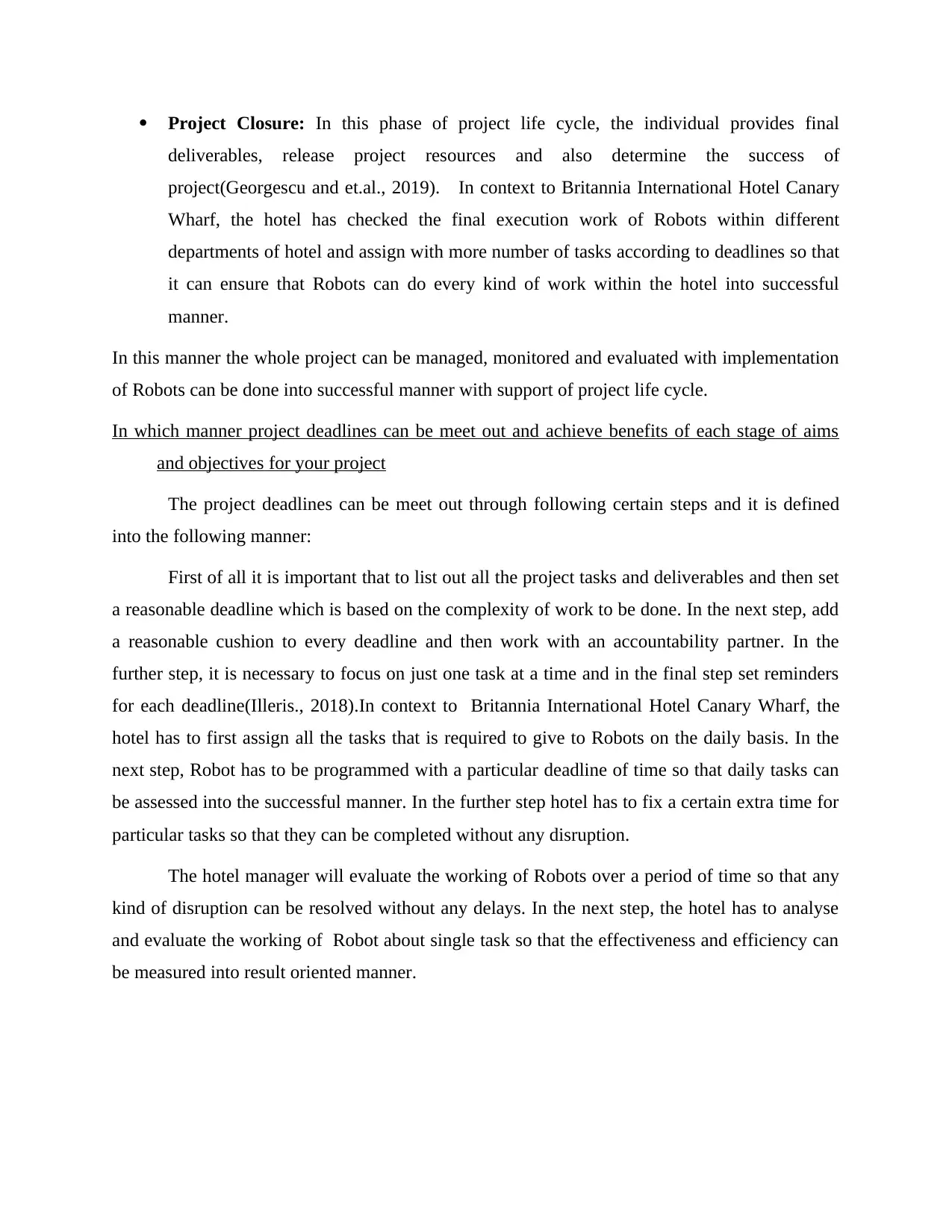
Project Closure: In this phase of project life cycle, the individual provides final
deliverables, release project resources and also determine the success of
project(Georgescu and et.al., 2019). In context to Britannia International Hotel Canary
Wharf, the hotel has checked the final execution work of Robots within different
departments of hotel and assign with more number of tasks according to deadlines so that
it can ensure that Robots can do every kind of work within the hotel into successful
manner.
In this manner the whole project can be managed, monitored and evaluated with implementation
of Robots can be done into successful manner with support of project life cycle.
In which manner project deadlines can be meet out and achieve benefits of each stage of aims
and objectives for your project
The project deadlines can be meet out through following certain steps and it is defined
into the following manner:
First of all it is important that to list out all the project tasks and deliverables and then set
a reasonable deadline which is based on the complexity of work to be done. In the next step, add
a reasonable cushion to every deadline and then work with an accountability partner. In the
further step, it is necessary to focus on just one task at a time and in the final step set reminders
for each deadline(Illeris., 2018).In context to Britannia International Hotel Canary Wharf, the
hotel has to first assign all the tasks that is required to give to Robots on the daily basis. In the
next step, Robot has to be programmed with a particular deadline of time so that daily tasks can
be assessed into the successful manner. In the further step hotel has to fix a certain extra time for
particular tasks so that they can be completed without any disruption.
The hotel manager will evaluate the working of Robots over a period of time so that any
kind of disruption can be resolved without any delays. In the next step, the hotel has to analyse
and evaluate the working of Robot about single task so that the effectiveness and efficiency can
be measured into result oriented manner.
deliverables, release project resources and also determine the success of
project(Georgescu and et.al., 2019). In context to Britannia International Hotel Canary
Wharf, the hotel has checked the final execution work of Robots within different
departments of hotel and assign with more number of tasks according to deadlines so that
it can ensure that Robots can do every kind of work within the hotel into successful
manner.
In this manner the whole project can be managed, monitored and evaluated with implementation
of Robots can be done into successful manner with support of project life cycle.
In which manner project deadlines can be meet out and achieve benefits of each stage of aims
and objectives for your project
The project deadlines can be meet out through following certain steps and it is defined
into the following manner:
First of all it is important that to list out all the project tasks and deliverables and then set
a reasonable deadline which is based on the complexity of work to be done. In the next step, add
a reasonable cushion to every deadline and then work with an accountability partner. In the
further step, it is necessary to focus on just one task at a time and in the final step set reminders
for each deadline(Illeris., 2018).In context to Britannia International Hotel Canary Wharf, the
hotel has to first assign all the tasks that is required to give to Robots on the daily basis. In the
next step, Robot has to be programmed with a particular deadline of time so that daily tasks can
be assessed into the successful manner. In the further step hotel has to fix a certain extra time for
particular tasks so that they can be completed without any disruption.
The hotel manager will evaluate the working of Robots over a period of time so that any
kind of disruption can be resolved without any delays. In the next step, the hotel has to analyse
and evaluate the working of Robot about single task so that the effectiveness and efficiency can
be measured into result oriented manner.
⊘ This is a preview!⊘
Do you want full access?
Subscribe today to unlock all pages.

Trusted by 1+ million students worldwide
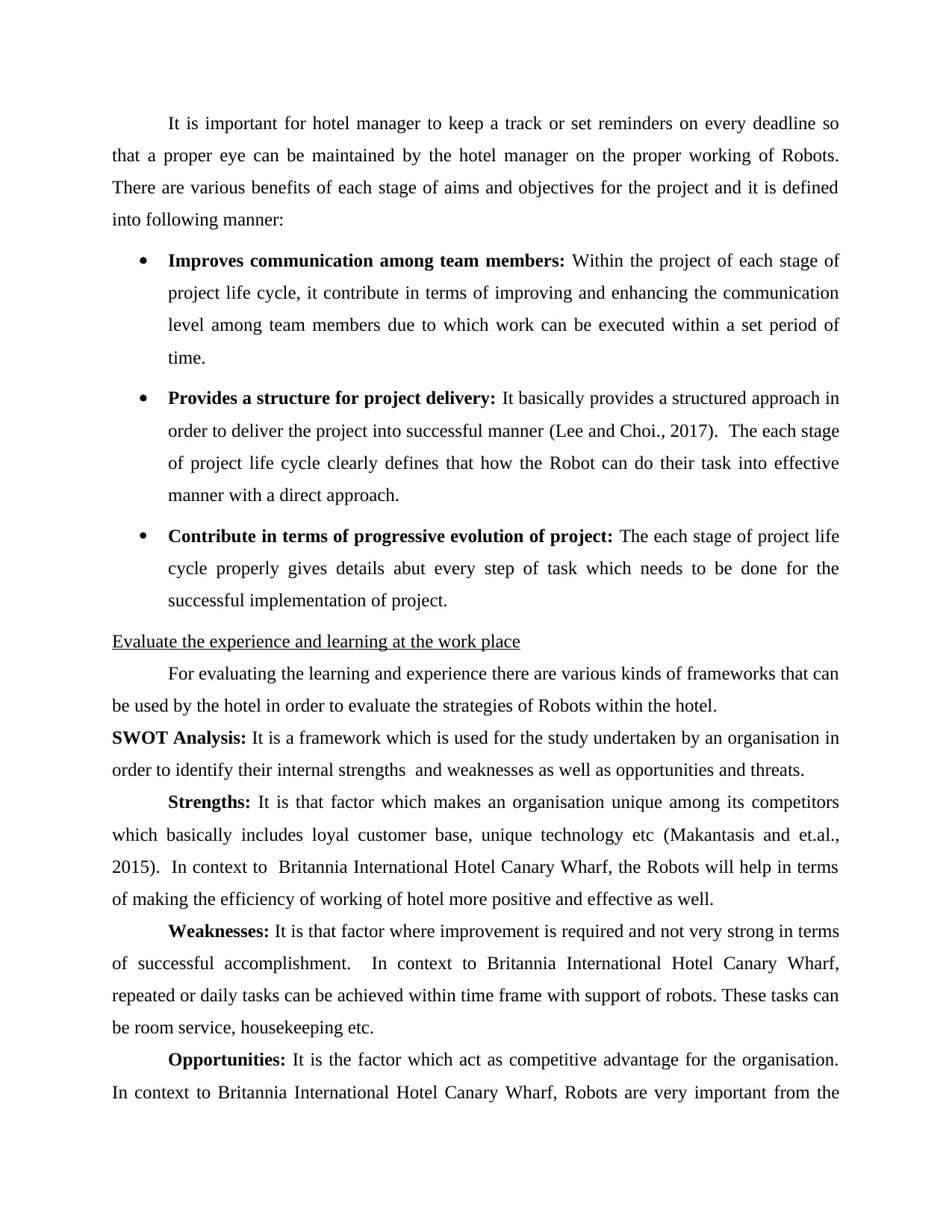
It is important for hotel manager to keep a track or set reminders on every deadline so
that a proper eye can be maintained by the hotel manager on the proper working of Robots.
There are various benefits of each stage of aims and objectives for the project and it is defined
into following manner:
Improves communication among team members: Within the project of each stage of
project life cycle, it contribute in terms of improving and enhancing the communication
level among team members due to which work can be executed within a set period of
time.
Provides a structure for project delivery: It basically provides a structured approach in
order to deliver the project into successful manner (Lee and Choi., 2017). The each stage
of project life cycle clearly defines that how the Robot can do their task into effective
manner with a direct approach.
Contribute in terms of progressive evolution of project: The each stage of project life
cycle properly gives details abut every step of task which needs to be done for the
successful implementation of project.
Evaluate the experience and learning at the work place
For evaluating the learning and experience there are various kinds of frameworks that can
be used by the hotel in order to evaluate the strategies of Robots within the hotel.
SWOT Analysis: It is a framework which is used for the study undertaken by an organisation in
order to identify their internal strengths and weaknesses as well as opportunities and threats.
Strengths: It is that factor which makes an organisation unique among its competitors
which basically includes loyal customer base, unique technology etc (Makantasis and et.al.,
2015). In context to Britannia International Hotel Canary Wharf, the Robots will help in terms
of making the efficiency of working of hotel more positive and effective as well.
Weaknesses: It is that factor where improvement is required and not very strong in terms
of successful accomplishment. In context to Britannia International Hotel Canary Wharf,
repeated or daily tasks can be achieved within time frame with support of robots. These tasks can
be room service, housekeeping etc.
Opportunities: It is the factor which act as competitive advantage for the organisation.
In context to Britannia International Hotel Canary Wharf, Robots are very important from the
that a proper eye can be maintained by the hotel manager on the proper working of Robots.
There are various benefits of each stage of aims and objectives for the project and it is defined
into following manner:
Improves communication among team members: Within the project of each stage of
project life cycle, it contribute in terms of improving and enhancing the communication
level among team members due to which work can be executed within a set period of
time.
Provides a structure for project delivery: It basically provides a structured approach in
order to deliver the project into successful manner (Lee and Choi., 2017). The each stage
of project life cycle clearly defines that how the Robot can do their task into effective
manner with a direct approach.
Contribute in terms of progressive evolution of project: The each stage of project life
cycle properly gives details abut every step of task which needs to be done for the
successful implementation of project.
Evaluate the experience and learning at the work place
For evaluating the learning and experience there are various kinds of frameworks that can
be used by the hotel in order to evaluate the strategies of Robots within the hotel.
SWOT Analysis: It is a framework which is used for the study undertaken by an organisation in
order to identify their internal strengths and weaknesses as well as opportunities and threats.
Strengths: It is that factor which makes an organisation unique among its competitors
which basically includes loyal customer base, unique technology etc (Makantasis and et.al.,
2015). In context to Britannia International Hotel Canary Wharf, the Robots will help in terms
of making the efficiency of working of hotel more positive and effective as well.
Weaknesses: It is that factor where improvement is required and not very strong in terms
of successful accomplishment. In context to Britannia International Hotel Canary Wharf,
repeated or daily tasks can be achieved within time frame with support of robots. These tasks can
be room service, housekeeping etc.
Opportunities: It is the factor which act as competitive advantage for the organisation.
In context to Britannia International Hotel Canary Wharf, Robots are very important from the
Paraphrase This Document
Need a fresh take? Get an instant paraphrase of this document with our AI Paraphraser
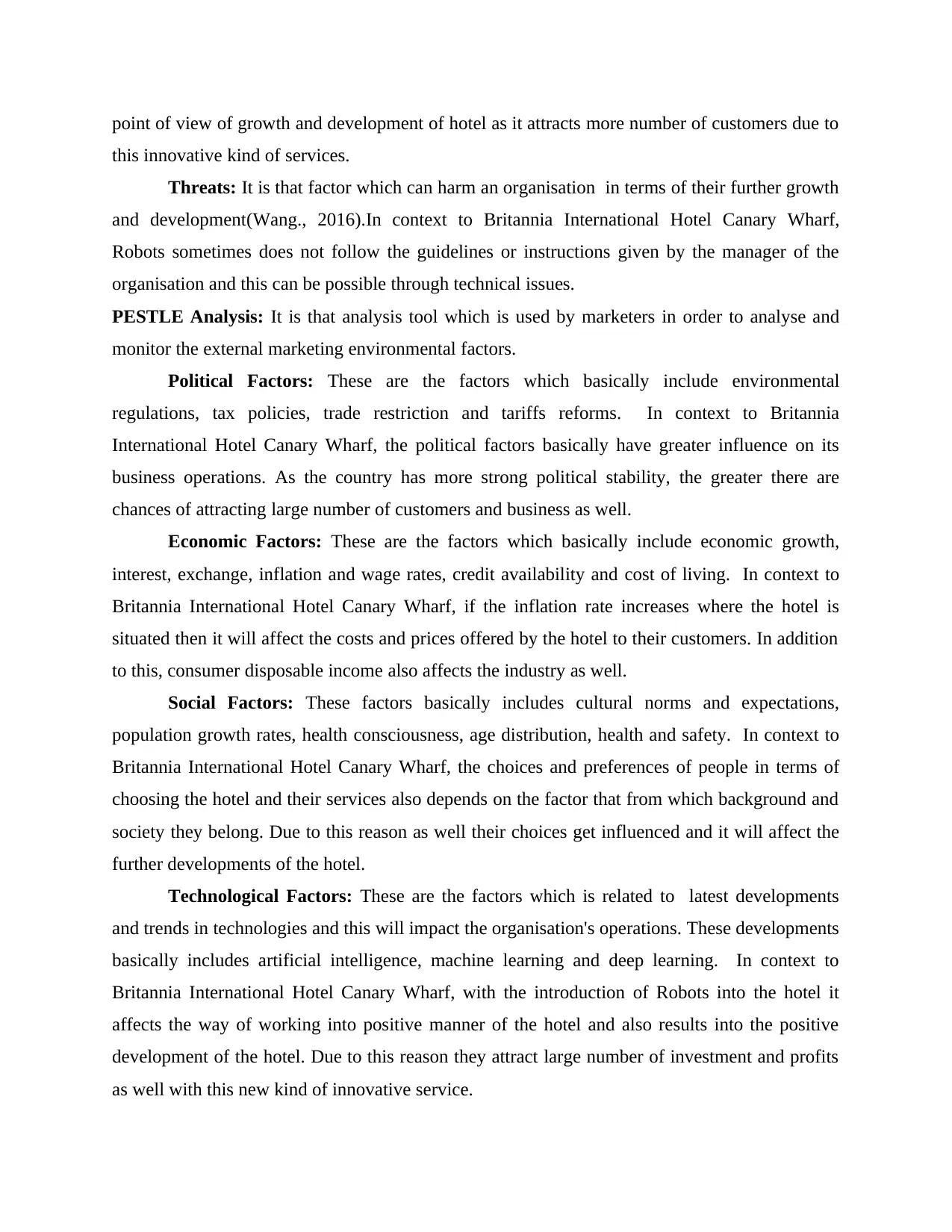
point of view of growth and development of hotel as it attracts more number of customers due to
this innovative kind of services.
Threats: It is that factor which can harm an organisation in terms of their further growth
and development(Wang., 2016).In context to Britannia International Hotel Canary Wharf,
Robots sometimes does not follow the guidelines or instructions given by the manager of the
organisation and this can be possible through technical issues.
PESTLE Analysis: It is that analysis tool which is used by marketers in order to analyse and
monitor the external marketing environmental factors.
Political Factors: These are the factors which basically include environmental
regulations, tax policies, trade restriction and tariffs reforms. In context to Britannia
International Hotel Canary Wharf, the political factors basically have greater influence on its
business operations. As the country has more strong political stability, the greater there are
chances of attracting large number of customers and business as well.
Economic Factors: These are the factors which basically include economic growth,
interest, exchange, inflation and wage rates, credit availability and cost of living. In context to
Britannia International Hotel Canary Wharf, if the inflation rate increases where the hotel is
situated then it will affect the costs and prices offered by the hotel to their customers. In addition
to this, consumer disposable income also affects the industry as well.
Social Factors: These factors basically includes cultural norms and expectations,
population growth rates, health consciousness, age distribution, health and safety. In context to
Britannia International Hotel Canary Wharf, the choices and preferences of people in terms of
choosing the hotel and their services also depends on the factor that from which background and
society they belong. Due to this reason as well their choices get influenced and it will affect the
further developments of the hotel.
Technological Factors: These are the factors which is related to latest developments
and trends in technologies and this will impact the organisation's operations. These developments
basically includes artificial intelligence, machine learning and deep learning. In context to
Britannia International Hotel Canary Wharf, with the introduction of Robots into the hotel it
affects the way of working into positive manner of the hotel and also results into the positive
development of the hotel. Due to this reason they attract large number of investment and profits
as well with this new kind of innovative service.
this innovative kind of services.
Threats: It is that factor which can harm an organisation in terms of their further growth
and development(Wang., 2016).In context to Britannia International Hotel Canary Wharf,
Robots sometimes does not follow the guidelines or instructions given by the manager of the
organisation and this can be possible through technical issues.
PESTLE Analysis: It is that analysis tool which is used by marketers in order to analyse and
monitor the external marketing environmental factors.
Political Factors: These are the factors which basically include environmental
regulations, tax policies, trade restriction and tariffs reforms. In context to Britannia
International Hotel Canary Wharf, the political factors basically have greater influence on its
business operations. As the country has more strong political stability, the greater there are
chances of attracting large number of customers and business as well.
Economic Factors: These are the factors which basically include economic growth,
interest, exchange, inflation and wage rates, credit availability and cost of living. In context to
Britannia International Hotel Canary Wharf, if the inflation rate increases where the hotel is
situated then it will affect the costs and prices offered by the hotel to their customers. In addition
to this, consumer disposable income also affects the industry as well.
Social Factors: These factors basically includes cultural norms and expectations,
population growth rates, health consciousness, age distribution, health and safety. In context to
Britannia International Hotel Canary Wharf, the choices and preferences of people in terms of
choosing the hotel and their services also depends on the factor that from which background and
society they belong. Due to this reason as well their choices get influenced and it will affect the
further developments of the hotel.
Technological Factors: These are the factors which is related to latest developments
and trends in technologies and this will impact the organisation's operations. These developments
basically includes artificial intelligence, machine learning and deep learning. In context to
Britannia International Hotel Canary Wharf, with the introduction of Robots into the hotel it
affects the way of working into positive manner of the hotel and also results into the positive
development of the hotel. Due to this reason they attract large number of investment and profits
as well with this new kind of innovative service.
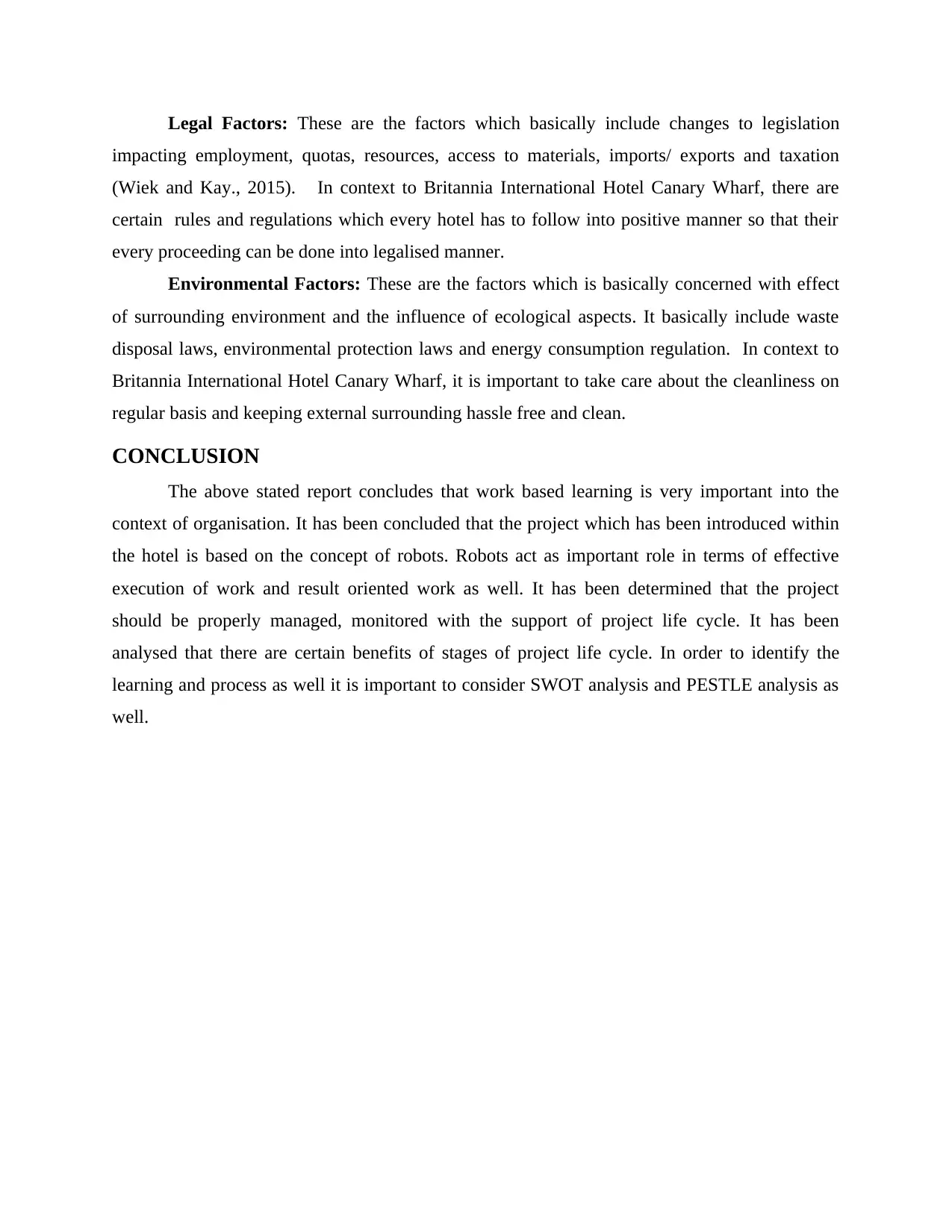
Legal Factors: These are the factors which basically include changes to legislation
impacting employment, quotas, resources, access to materials, imports/ exports and taxation
(Wiek and Kay., 2015). In context to Britannia International Hotel Canary Wharf, there are
certain rules and regulations which every hotel has to follow into positive manner so that their
every proceeding can be done into legalised manner.
Environmental Factors: These are the factors which is basically concerned with effect
of surrounding environment and the influence of ecological aspects. It basically include waste
disposal laws, environmental protection laws and energy consumption regulation. In context to
Britannia International Hotel Canary Wharf, it is important to take care about the cleanliness on
regular basis and keeping external surrounding hassle free and clean.
CONCLUSION
The above stated report concludes that work based learning is very important into the
context of organisation. It has been concluded that the project which has been introduced within
the hotel is based on the concept of robots. Robots act as important role in terms of effective
execution of work and result oriented work as well. It has been determined that the project
should be properly managed, monitored with the support of project life cycle. It has been
analysed that there are certain benefits of stages of project life cycle. In order to identify the
learning and process as well it is important to consider SWOT analysis and PESTLE analysis as
well.
impacting employment, quotas, resources, access to materials, imports/ exports and taxation
(Wiek and Kay., 2015). In context to Britannia International Hotel Canary Wharf, there are
certain rules and regulations which every hotel has to follow into positive manner so that their
every proceeding can be done into legalised manner.
Environmental Factors: These are the factors which is basically concerned with effect
of surrounding environment and the influence of ecological aspects. It basically include waste
disposal laws, environmental protection laws and energy consumption regulation. In context to
Britannia International Hotel Canary Wharf, it is important to take care about the cleanliness on
regular basis and keeping external surrounding hassle free and clean.
CONCLUSION
The above stated report concludes that work based learning is very important into the
context of organisation. It has been concluded that the project which has been introduced within
the hotel is based on the concept of robots. Robots act as important role in terms of effective
execution of work and result oriented work as well. It has been determined that the project
should be properly managed, monitored with the support of project life cycle. It has been
analysed that there are certain benefits of stages of project life cycle. In order to identify the
learning and process as well it is important to consider SWOT analysis and PESTLE analysis as
well.
⊘ This is a preview!⊘
Do you want full access?
Subscribe today to unlock all pages.

Trusted by 1+ million students worldwide
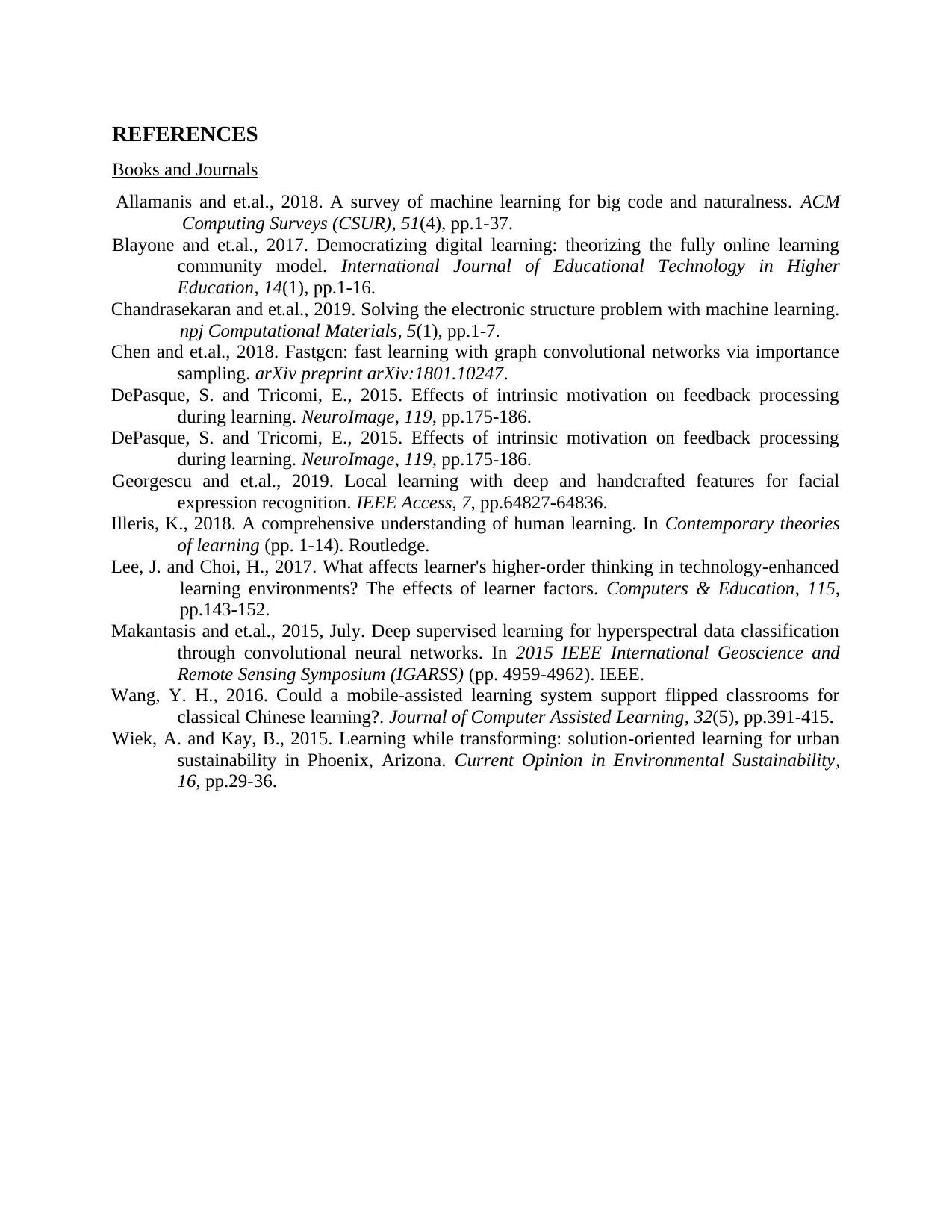
REFERENCES
Books and Journals
Allamanis and et.al., 2018. A survey of machine learning for big code and naturalness. ACM
Computing Surveys (CSUR), 51(4), pp.1-37.
Blayone and et.al., 2017. Democratizing digital learning: theorizing the fully online learning
community model. International Journal of Educational Technology in Higher
Education, 14(1), pp.1-16.
Chandrasekaran and et.al., 2019. Solving the electronic structure problem with machine learning.
npj Computational Materials, 5(1), pp.1-7.
Chen and et.al., 2018. Fastgcn: fast learning with graph convolutional networks via importance
sampling. arXiv preprint arXiv:1801.10247.
DePasque, S. and Tricomi, E., 2015. Effects of intrinsic motivation on feedback processing
during learning. NeuroImage, 119, pp.175-186.
DePasque, S. and Tricomi, E., 2015. Effects of intrinsic motivation on feedback processing
during learning. NeuroImage, 119, pp.175-186.
Georgescu and et.al., 2019. Local learning with deep and handcrafted features for facial
expression recognition. IEEE Access, 7, pp.64827-64836.
Illeris, K., 2018. A comprehensive understanding of human learning. In Contemporary theories
of learning (pp. 1-14). Routledge.
Lee, J. and Choi, H., 2017. What affects learner's higher-order thinking in technology-enhanced
learning environments? The effects of learner factors. Computers & Education, 115,
pp.143-152.
Makantasis and et.al., 2015, July. Deep supervised learning for hyperspectral data classification
through convolutional neural networks. In 2015 IEEE International Geoscience and
Remote Sensing Symposium (IGARSS) (pp. 4959-4962). IEEE.
Wang, Y. H., 2016. Could a mobile‐assisted learning system support flipped classrooms for
classical Chinese learning?. Journal of Computer Assisted Learning, 32(5), pp.391-415.
Wiek, A. and Kay, B., 2015. Learning while transforming: solution-oriented learning for urban
sustainability in Phoenix, Arizona. Current Opinion in Environmental Sustainability,
16, pp.29-36.
Books and Journals
Allamanis and et.al., 2018. A survey of machine learning for big code and naturalness. ACM
Computing Surveys (CSUR), 51(4), pp.1-37.
Blayone and et.al., 2017. Democratizing digital learning: theorizing the fully online learning
community model. International Journal of Educational Technology in Higher
Education, 14(1), pp.1-16.
Chandrasekaran and et.al., 2019. Solving the electronic structure problem with machine learning.
npj Computational Materials, 5(1), pp.1-7.
Chen and et.al., 2018. Fastgcn: fast learning with graph convolutional networks via importance
sampling. arXiv preprint arXiv:1801.10247.
DePasque, S. and Tricomi, E., 2015. Effects of intrinsic motivation on feedback processing
during learning. NeuroImage, 119, pp.175-186.
DePasque, S. and Tricomi, E., 2015. Effects of intrinsic motivation on feedback processing
during learning. NeuroImage, 119, pp.175-186.
Georgescu and et.al., 2019. Local learning with deep and handcrafted features for facial
expression recognition. IEEE Access, 7, pp.64827-64836.
Illeris, K., 2018. A comprehensive understanding of human learning. In Contemporary theories
of learning (pp. 1-14). Routledge.
Lee, J. and Choi, H., 2017. What affects learner's higher-order thinking in technology-enhanced
learning environments? The effects of learner factors. Computers & Education, 115,
pp.143-152.
Makantasis and et.al., 2015, July. Deep supervised learning for hyperspectral data classification
through convolutional neural networks. In 2015 IEEE International Geoscience and
Remote Sensing Symposium (IGARSS) (pp. 4959-4962). IEEE.
Wang, Y. H., 2016. Could a mobile‐assisted learning system support flipped classrooms for
classical Chinese learning?. Journal of Computer Assisted Learning, 32(5), pp.391-415.
Wiek, A. and Kay, B., 2015. Learning while transforming: solution-oriented learning for urban
sustainability in Phoenix, Arizona. Current Opinion in Environmental Sustainability,
16, pp.29-36.
Paraphrase This Document
Need a fresh take? Get an instant paraphrase of this document with our AI Paraphraser


⊘ This is a preview!⊘
Do you want full access?
Subscribe today to unlock all pages.

Trusted by 1+ million students worldwide
1 out of 12
Related Documents
Your All-in-One AI-Powered Toolkit for Academic Success.
+13062052269
info@desklib.com
Available 24*7 on WhatsApp / Email
![[object Object]](/_next/static/media/star-bottom.7253800d.svg)
Unlock your academic potential
Copyright © 2020–2026 A2Z Services. All Rights Reserved. Developed and managed by ZUCOL.





